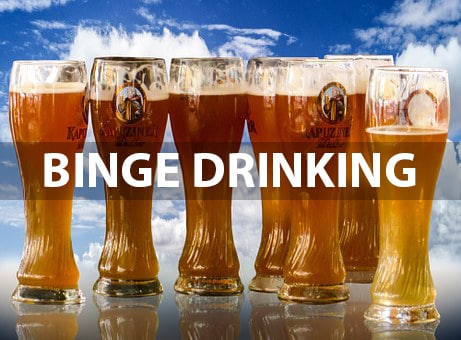
Who binge drinks and why?
Binge drinking typically starts at a young age. According to National Surveys, 90% of alcohol consumed by youth under the age of 21 in the US is in the form of binge drinking.
In high school there is peer pressure to drink and curiosity about drinking. Others tend to binge drink to relieve stress, help with anxiety, or cope with loss. More men binge drink than women, and even though college binge drinking is prevalent, 70% of binge drinking episodes involve adults age 26 years and older. Statistics show that binge drinking is not something that can be assumed to be normal at the young adult age and typically “outgrown”.
Even though binge drinking is not the same as alcohol dependence, a binge drinker has a significant increase in the risk of developing an alcohol dependence. In short, a binge drinker can progress quickly into an alcoholic, so early treatment is important.
Dangers of binge drinking
Binge drinking is also associated with many mental and physical health problems such as:
• Unintentional injuries, such as motor-vehicle traffic crashes, falls, drowning, burns and firearm injuries
• Chronic diseases such as liver cirrhosis pancreatitis (inflammation of the pancreas)
• Cancer including liver, mouth, throat, larynx (the voice box), and esophagus
• High blood pressure
• Harm to a developing fetus if a woman drinks while pregnant
• Diabetes complications
• Psychological disorders
• Violence, such as child abuse, homicide, and suicide
Alcohol poisoning
Alcohol poisoning is the most extreme life threatening consequence of binge drinking. Binge drinking to an alcohol poisoning state affects the body’s involuntary reflexes such as the gag reflex and breathing. Critical symptoms of alcohol poisoning are:
• Vomiting
• Seizures
• Slow Breathing (less than 8 breaths per minute)
• Irregular Breathing
• Low body temperature
• Pale or blue skin
• Unconsciousness or unresponsive
Alcohol poisoning can lead to irreversible brain damage or death and must be taken seriously. If you suspect someone has overdosed with alcohol, call 911 for help. Please be safe, not sorry.
If you or a loved one is struggling with binge drinking, call New Day Recovery today! Your call is confidential.







